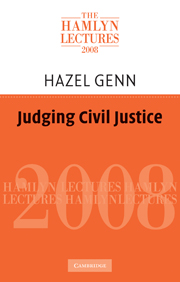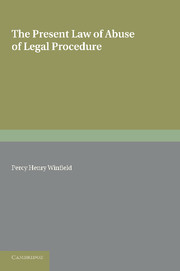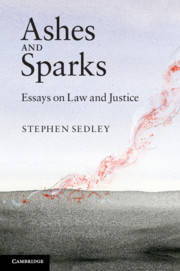English Civil Justice after the Woolf and Jackson Reforms
A Critical Analysis
- Author: John Sorabji, University College London
- Date Published: March 2016
- availability: Available
- format: Paperback
- isbn: 9781107669468
Paperback
Other available formats:
Hardback, eBook
Looking for an inspection copy?
This title is not currently available for inspection. However, if you are interested in the title for your course we can consider offering an inspection copy. To register your interest please contact [email protected] providing details of the course you are teaching.
-
John Sorabji examines the theoretical underpinnings of the Woolf and Jackson reforms to the English and Welsh civil justice system. He discusses how the Woolf reforms attempted, and failed, to effect a revolutionary change to the theory of justice that informed how the system operated. It elucidates the nature of those reforms, which through introducing proportionality via an explicit overriding objective into the Civil Procedure Rules, downgraded the court's historic commitment to achieving substantive justice or justice on the merits. In doing so, Woolf's new theory is compared with one developed by Bentham, while also exploring why a similarly fundamental reform carried out in the 1870s succeeded where Woolf's failed. It finally proposes an approach that could be taken by the courts following implementation of the Jackson reforms to ensure that they succeed in their aim of reducing litigation cost through properly implementing Woolf's new theory of justice.
Read more- Places the nature of the Woolf and Jackson reforms in their historical context
- Readers will gain an in-depth understanding of what the House of Lords has described as the new philosophy of English civil justice
- Explains how the courts can properly implement the Jackson reform's aim of reducing litigation costs to no more than are proportionate
Reviews & endorsements
'The significance and originality of the work lies in the success of Sorabji's jurisprudential project - to place the reforms of Woolf and Jackson in the wider context of theories of justice and, in particular, to identify structural similarities between Lord Woolf's vision and the prescient writings of Jeremy Bentham.' Richard Susskind, The Times
See more reviews'… a polished, sophisticated, challenging, and important study. It will enrich all courses on civil justice where the professor or student dares to ask: 'what are these rules for; and how should they be implemented?'.' Neil Andrews, International Journal of Procedural Law
Customer reviews
Not yet reviewed
Be the first to review
Review was not posted due to profanity
×Product details
- Date Published: March 2016
- format: Paperback
- isbn: 9781107669468
- length: 284 pages
- dimensions: 230 x 153 x 15 mm
- weight: 0.43kg
- availability: Available
Table of Contents
Part I. Theories of Justice:
1. The crisis in civil justice
2. Substantive justice and the RSC
3. Bentham, substantive justice is no end in itself
Part II. Woolf's New Theory of Justice:
4. Woolf's new theory: a traditionalist view
5. The overriding objective: a new theory of justice (I)
6. The overriding objective: a new theory of justice (II)
Part III. Implementation:
7. Problems of proportionate justice.
Sorry, this resource is locked
Please register or sign in to request access. If you are having problems accessing these resources please email [email protected]
Register Sign in» Proceed
You are now leaving the Cambridge University Press website. Your eBook purchase and download will be completed by our partner www.ebooks.com. Please see the permission section of the www.ebooks.com catalogue page for details of the print & copy limits on our eBooks.
Continue ×Are you sure you want to delete your account?
This cannot be undone.
Thank you for your feedback which will help us improve our service.
If you requested a response, we will make sure to get back to you shortly.
×




.jpg)